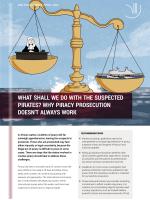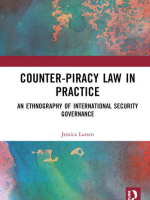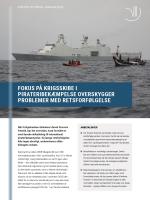What shall we do with the suspected pirates?

In African waters, incidents of piracy still far outweigh apprehensions, leaving few suspects to prosecute. Those who are prosecuted may face either impunity or legal uncertainty, because the illegal act of piracy is difficult to prove in some cases. There are steps that the states involved in counter-piracy should take to address these challenges.
■ Maritime policing capabilities need to be strengthened to increase apprehension of piracy suspects at sea, and kingpins hiding on land must be targeted.
■ Willing jurisdictions should be identified, after which transfer agreements, legal reform, training of judiciaries and renovations to penitentiaries can secure access to prosecution services.
■ Guidelines for crime scene investigation and evidence collection need to be updated to help ensure that the necessary evidence is collected for successful prosecution.
■ Prosecuting authorities may consider amending criminal law to reflect modern-day piracy. For instance, by criminalising objects typically used in piracy operations, such as hooked ladders, powerful motors and excessive amounts of fuel.
Piracy has been a constant issue of concern since the early 2000s in the waters off East and West Africa, albeit with numbers of incidents fluctuating with seasons and geography. The international community has in both theatres developed a practice, where international navies patrol the waters and hand over suspects for prosecution in regional states. But bringing piracy suspects to justice faces many challenges. This policy brief points to the main issues and possible solutions.
Piracy math: The inconvenient numbers
In the Indian Ocean, piracy attacks surged around 2008. The International Maritime Bureau (IMB) registered 111 incidents that year, followed by 217 attacks in 2009, of which 47 were successful hijackings. Incidents were at their highest in 2011. There were 327 reported attacks this year alone, and 28 successful hijackings.
Around this period, piracy in the Gulf of Guinea assumed the position as the global hotspot. The IMB recorded 39 incidents in 2010, 51 in 2011 and 60 in 2012. The number peaked in 2020, where the Gulf of Guinea accounted for 95% of global attacks, which translated into 114 incidents, including 21 successful hijackings.
But how many of the perpetrators in these cases were actually prosecuted?
There is no systematic attention paid to the ratio between incidents, apprehensions and prosecution.
The last central attempt to collect statistics was in 2012 by the UN covering only Somali piracy. It concluded that between 2006 and 2012, 1,063 individuals had been tried by 20 different states (but not necessarily convicted). This translates to about 100-150 piracy prosecution cases in total during those seven years, in other words a fraction of the reported incidents.
Since then, statistics are hard to come by. When asking the UN, the EU and other international actors involved in counter-piracy, they either do not collect data on the ratio between incidents, apprehensions and prosecution, or they are unwilling to share. We may therefore only rely on ‘guesstimations’. Fortunately, piracy cases are somewhat spectacular and are therefore regularly reported in the media, although these reports cannot be taken as exhaustive accounts.
Since 2012, states deploying navies to the western Indian Ocean have prosecuted cases of Somali piracy. The US and France have been reported to prosecute three cases of Somali piracy each; India one case; South Korea two cases; In the immediate region around Somalia, Seychelles has prosecuted 17 cases; Kenya around 19 cases; Mauritius one case. In total, there have been 37 regional prosecutions regarding Somali piracy. Given that regional states received suspects through formalised transfer agreements – and given that the number of annual incidents ranged in the hundreds for some years in the Indian Ocean – the number of regional prosecutions is low.
It is not surprising that there are more crimes committed than solved. But the pattern is significant. When suspects are caught and released without trial and piracy groups avoid any form of punishment, it creates the best conditions for relapse and encourages repetition.
Hidden in these low prosecution numbers are two conditions. Firstly, that navies are – of course – not able to intercept all attacks. But also that not all suspects apprehended by the navies are brought to justice.
An interesting example here is Denmark, where numbers explaining the ratio between apprehensions and prosecutions is available. Denmark has made active counter-piracy efforts, and the Royal Danish Navy has apprehended 300 piracy suspects between 2008 and 2021.
The majority of apprehensions took place off the coast of Somalia, while one was in the Gulf of Guinea. Yet of the 300 suspects, only 51 were prosecuted. This reflects the global situation in the Indian Ocean in the early days of Somali piracy: in 2011, the UN reported that 90% of all apprehended suspects were released without trial, the so-called ‘catch and release’ procedure.
The situation is even more stark if we look to the Gulf of Guinea. Only three incidents have been tried in court since piracy numbers increased around the mid-2010s. One case was tried in Togo; one in Nigeria; and one in Denmark (although this was technically not a piracy-related charge). Here, we recall that there were 115 reported piracy incidents in 2020 alone.
The unfortunate ratio between incidents and prosecution exposes three main challenges to international counter-piracy efforts, each with its own possible solutions.
Challenge 1: Capacity to apprehend suspects
It is not surprising that there are more crimes committed than solved. But the pattern is significant. It shows that attacks and successful hijackings continue to take place without effective maritime policing to provide security at sea and ensure freedom of navigation. When suspects are caught and released without trial and piracy groups avoid any form of punishment, it creates the best conditions for relapse and encourages repetition.
While a handful of warships were used to patrol the western Indian Ocean during the peak of Somali piracy, the number of incidents by far outweighed their ability to react in the vast expanse of the ocean. Similarly in the Gulf of Guinea, the maritime domain may be significantly smaller, yet few states have carried out counter-piracy operations in this area. Italy was the only state with a mandate to deter suspects, briefly joined by Demark in 2021. Many coastal states in the region are restricted by a lack of operational vessels, political mandates, legal frameworks and/or the training and financial resources to patrol the Gulf of Guinea.
With no apprehended suspects, prosecution cannot take place. Dedicated attention needs to be paid to the here-and-now solutions to facilitate vessel capabilities that may mend the gap in maritime policing.
That said, piracy does not take place only at sea. The kingpins organising and financing piracy operations on land are left largely untouched because the capacity of maritime policing focuses on the ‘foot soldiers’ carrying out piracy operations at sea. To really curb piracy, both sea- and land-based policing are necessary.
In Seychelles, 6 cases of 17 Somali piracy cases were appealed. Five of these cases saw the convictions overturned, and the convicted parties returned to Somalia as free men. The appeal judges strongly criticised the first-instance court’s reliance on evidence, which they found insufficient or entirely lacking.
Challenge 2: Finding a courtroom
Maritime piracy is an illegal act taking place on the high seas (cf. UNCLOS Article 101), i.e. outside the territorial waters of any state. This grants universal jurisdiction over piracy, meaning that any state has the authority to react on suspicion of piracy, no matter the nationality of the ship, its crew or the perpetrator(s).
But piracy is prosecuted domestically (cf. UNCLOS Article 105). There is no international court with an appropriate mandate to undertake piracy trials. This injects political, legal and practical challenges to bring piracy suspects to trial. They all relate to finding an appropriate court room.
Politically, a state may not want to prosecute. This has been the case with many (Western) states. They may not want the risks of piracy suspects claiming asylum once entering the prosecuting state, which was attempted in the Netherlands in 2009 and in Denmark in 2023. Nor may they want a situation where they are not able to repatriate suspects after the court case due to human rights obligations, since suspects most often come from volatile regions.
Legally, not all states have appropriate legislation in place to prosecute. Many states lack provisions in their domestic laws that criminalise piracy, or they lack universal jurisdiction to bring cases to trial. This is why massive capacity-building of legal infrastructures is taking place in coastal states of piracy-prone waters.However, the new criminal provisions are not always sufficient (see Challenge 3).
Practically, states that patrol and prosecute piracy need to have appropriate cooperation frameworks and procedures in place to even make trials possible. Hand-over agreements were formulated in the context of Somali piracy and have likewise been drafted in the Gulf of Guinea – but they have yet to be adopted by coastal states to ensure legal finish.
Challenge 3: Proving the act of piracy
If we shift focus to those piracy cases that have actually been undertaken, they reveal several problems that need to be addressed if legal finish is to be ensured.
Firstly, it has been difficult in some cases to produce evidence strong enough to prove the act of piracy beyond a reasonable doubt. Research shows that cases of suspected piracy off the coast of Somalia were dismissed due to the prosecuting authorities assessing that evidence was insufficient to prove the illegal act of piracy. This was especially in cases where suspects had been apprehended on suspicion of attempted attacks, where evidence is naturally weak. More recently, it may have played a role when Danish authorities had to abandon piracy charges of a Nigerian national and instead prosecute him for a much lesser offence, namely causing danger to military personnel.
Secondly, insufficient evidence has led to successful appeals. In Seychelles, 6 cases of 17 Somali piracy cases were appealed. 5 of these cases saw the convictions overturned, and the convicted parties returned to Somalia as free men. The appeal judges strongly criticised the first-instance court’s reliance on evidence, which they found insufficient or entirely lacking. They also found that the defence case had barely been heard or taken into consideration in the judgements.
One may ask what would have happened, had the remining 11 of the 17 cases also been appealed? Even if evidence has been insufficient in some piracy cases, this does not mean that the convicted were necessarily innocent, although it does suggest that legal certainty may be challenged. And it does mean that piracy can be difficult to prove.
Authorities involved in counter-piracy should therefore consider reformulating the procedures that navies use in counter-piracy operations at sea to guide crime scene investigations and evidence collection. Updated procedures should take account of the lessons learned from failed piracy prosecution, where evidence was insufficient, and strengthen the type and range of evidence.
Furthermore, a reform of relevant criminal law may be required. This includes consideration of how modern-day piracy practices can be better reflected in the legal definition of piracy in criminal law. Here, equipment clauses may be useful. They entail criminalising certain items onboard the suspected piracy vessel. This could be weapons and hooked ladders, which are instruments known to be used in piracy operations. Likewise, large amounts of fuel and water may indicate uncharacteristically long voyages. These latter items, however, are tricky to legislate against, as they are not incriminating in and of themselves. It is therefore necessary to exercise great care to avoid encroaching on the principle of legal certainty.
Sections of this policy brief were written as part of the project ‘Counter-piracy Infrastructures in the Gulf of Guinea’ (COPIGoG), kindly funded by a Grant from the Danish Ministry of Foreign Affairs, administered by the Danida Fellowship Centre
DIIS Experts





